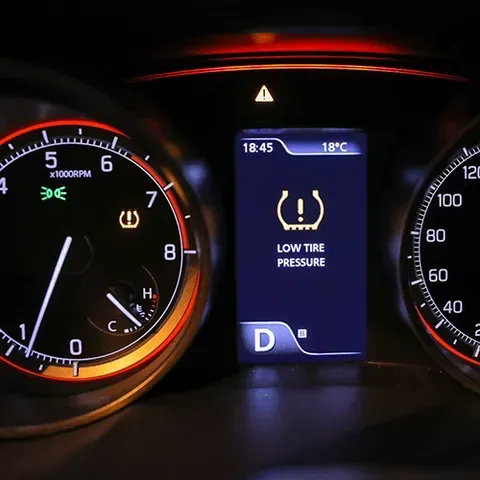TPMS Service
The Tire Guardian: TPMS and Your Daily Commute
If you’ve ever noticed the little horseshoe-shaped yellow indicator on your vehicle's dashboard, that’s the Tire Pressure Monitoring System (TPMS). It’s the vehicle’s built-in way of alerting you when one or more of your tires are low on air pressure. An under-inflated tire can turn into an extreme hazard on the road and could even cause you to lose control of the vehicle. The TPMS indicator light shouldn't be ignored, so take your vehicle to be serviced by {Client}’s team of technicians if you ever see it.
Here are some things you need to know about this all-important system.

How Does TPMS Work?
There are two kinds of TPMS sensors in widespread use today: mechanical and electronic. Both are reliable, but both need regular calibration and maintenance to remain in working condition. A mechanical TPMS requires recalibration to give an accurate measurement, and an electronic TPMS works on batteries that must be replaced at regular intervals. Without regular maintenance, neither mechanical nor electronic TPMS systems will work indefinitely.
Mechanical TPMS technology has a diaphragm and spring design that connects to the vehicle’s wheel system. When the TPMS sensors detect an inflation level outside of the vehicle’s recommended parameters, the TPMS warning light will activate to alert you.
An electronic TPMS, on the other hand, depends on having a working battery. The system connects to the vehicle’s onboard computer, signaling it when the TPMS pressure gauge detects something amiss. If the TPMS battery goes too long without service, it can wear out, causing the sensor and alert system to fail.
Both systems tend to become less accurate over time without maintenance. Plus, many people don’t know that tire rotation or replacement can throw the TPMS sensor off. Whenever you take your vehicle in for tire service, it's a good idea to ask about a TPMS reset too.
The skilled technicians at Capeway Auto Service and Towing
would be happy to help you with this.
Different Kinds of TPMS Sensors
TPMS sensors can be either direct or indirect. Each of these has its own set of advantages that make them better suited for different vehicle types.
Direct TPMS Sensors
A direct TPMS sensor, as the name implies, gauges tire pressure “directly” from inside the wheel. It is equipped with a battery-powered transmitter linked to the onboard computer and can communicate with it when a problem arises.
Direct TPMS sensors can also be either mechanical or electronic. If they’re mechanical, that means there’s physical contact between the TPMS sensor and the tire’s valve stem to measure the pressure. In an electronic direct sensor, the TPMS uses wireless technology to make that measurement.
Indirect TPMS Sensors
Indirect TPMS sensors don’t make direct contact with the tire pressure valve. They’re installed on either the wheel hub or the brake rotor, using the vehicle’s ABS (Anti-lock Brake System) to their advantage. The sensors search for changes in wheel speed rotation to make reasonably accurate tire pressure measurements.
We say “reasonably accurate” because the lack of contact means indirect TPMS sensors aren’t as accurate as direct TPMS sensors. This means an indirect TPMS sensor might not detect problems, such as air leaks, as quickly as a direct TPMS sensor could.
Many vehicles these days integrate both direct and indirect TPMS sensors to get the best of both worlds by taking advantage of the TPMS benefits of each of these systems.
Faulty TPMS Systems: Signs to Watch For
Considering the significance of the TPMS system, it’s important to know how to identify various signs that something has gone wrong with it. If you notice any of these symptoms, be sure to take your vehicle to Capeway Auto Service and Towing for TPMS repair:
- The dashboard warning light suddenly turns on. This is one of the most common indicators that something has gone wrong. If you see the TPMS warning light, it could mean that anything from light maintenance to a full TPMS replacement is in order.
- Inaccurate tire pressure readings. This could also manifest as a TPMS warning light that only shows up intermittently. It could mean the system can’t ensure TPMS accuracy right now, so take the vehicle in to get checked.
- No tire pressure readings at all. You should be able to see a tire pressure report through the vehicle computer. If there’s nothing there, or if the values fluctuate too much, it’s a common sign that something is up.
Capeway Auto Service and Towing: Your Choice for TPMS Function and Repair Solutions
Capeway Auto Service and Towing has years of experience in automotive repair and service in Hanover, MA. Our team knows the ins and outs of TPMS repair, and we’ll be here to help you keep your vehicle in working order for many years to come.
If you have any questions or concerns about your vehicle’s TPMS system, don’t hesitate to call us at
(781) 826-2051. We’re here for you when you need us.
